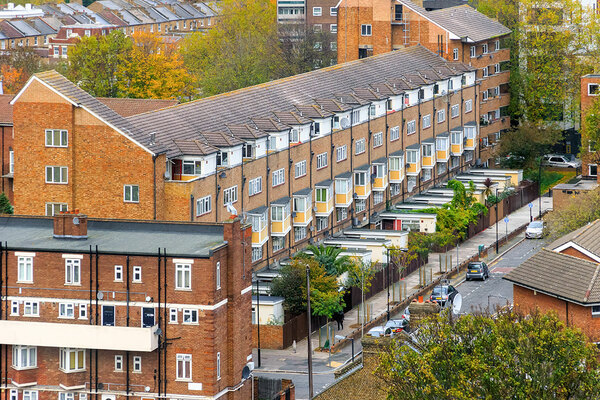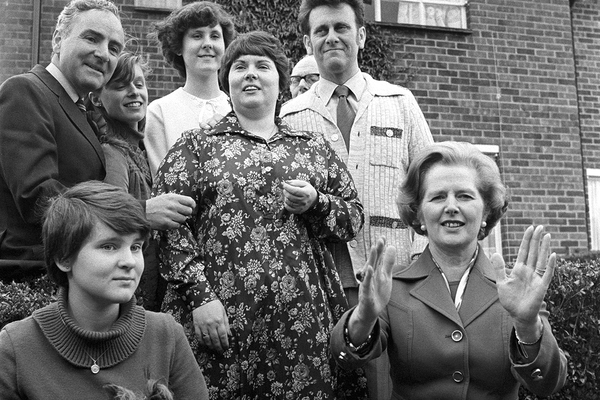Whose Right to Buy? New research raises fears of fraud
The Right to Buy was launched to give tenants living in council housing the chance to buy their home. However, the reality is often somewhat different. Nathaniel Barker investigates who is really purchasing these properties. Illustration by Jack Teagle
Announcing new, bumper Right to Buy discounts in 2012, David Cameron declared that the policy “helped millions of people living in council housing achieve their aspiration of owning their own home”, giving “something back to families who worked hard, paid their rent and played by the rules”.
But for the Right to Buy, the vision does not match the reality. Inside Housing has already revealed that four in 10 homes sold have fallen into the hands of private landlords – with that figure on the rise. Earlier this year, the BBC found 139 cases of people reselling homes bought through the policy within one month.
Now, our exclusive research uncovers that one in seven purchases of council homes are completed by tenants receiving housing benefit. This is important because it means someone else must be providing cash to help with the purchase. As pointed out by Eamon McGoldrick, managing director at the National Federation of ALMOs: “If you get people funding purchases there’s got to be something in it for them.”
Using Freedom of Information Act laws, we gathered data from 95 of England’s 165 stock-retaining councils, showing they have offloaded at least 4,686 properties to tenants who were in receipt of full or part housing benefit at the point of sale since discounts were hiked in April 2012 – 14.4% of their total Right to Buys in that time. These public assets had a market value of more than £517.6m – sold with discounts averaging 45% of the value and up to £110,500 in London.
In most such cases, the third party is likely to be a family member – often a son or daughter who sees the Right to Buy as an attractive inheritance boost courtesy of HM Treasury.
“We are getting relatives providing the cash and then later on a transfer takes place,” notes Dave Richmond, assistant director of neighbourhoods and housing at Hull City Council, which has had a nation-topping 313 homes bought by council tenants on housing benefit since 2012. “Whether or not we think that is morally right or wrong, it’s not against the law.”
Government rules state that it does not matter how a Right to Buy purchase is financed – only that legal ownership of the property must go to the tenant, with family members able to join the deeds if they can show they have been living at the home for 12 months. In that case, the home can be transferred to the family member’s full ownership straight away without penalty, or may otherwise be transferred after five years without losing the discount – not a bad length of time to save around £60,000.
These arrangements can lead to problems for the tenants, who may not realise they risk losing their housing benefit entitlement once listed as homeowners or are likely to struggle with the costs of maintaining a property. Worse still, relationship breakdowns with family members or spouses could see them turfed out.
“The Right to Buy is open to abuse. There are many loopholes for fraudsters to abuse the system”
Katrina Robinson, Tenancy Fraud Forum
Money advice forums are strewn with queries from people asking about purchasing parents’ council homes as a route onto the housing ladder, and the line between legitimately leveraging the rules and outright fraud can be blurry. In 2017, a bank manager was given a suspended jail sentence and a £25,000 bill for attempting to buy her father’s Cheltenham council home when she did not live there, despite the judge concluding she had been trying to help her tenant parents rather than make a profit.
Official figures on Right to Buy fraud are not compiled, but Katrina Robinson, chair of the Tenancy Fraud Forum and a solicitor at Shepherds Bush Housing Group, fears it is rife. “The Right to Buy is open to abuse,” she says. “There are many loopholes for fraudsters to abuse the system.”
Andrew Lane, a barrister who literally wrote the book on social housing fraud, believes that should be no surprise: “The reality is, when you’ve got such a juicy incentive on offer in the form of large discounts, it’s going to happen – a minority of people are going to cheat.” In its last Protecting the Public Purse report before being scrapped in 2015, the Audit Commission warned that Right to Buy fraud cases had increased by over 400% between April 2012 and March 2014.
Ruth Jones, senior officer at a counter fraud unit operating across four Gloucestershire councils, explains that the most common form of Right to Buy fraud involves lying about income. “Just because you work doesn’t mean you can get a mortgage, so people might say they wash up for £25,000 a year,” she says. “Once the mortgage company accepts that it makes it very difficult to prevent a sale.”
“People might say they wash up for £25,000 a year. Once the mortgage company accepts that it makes it very difficult to prevent a sale”
Ruth Jones, Gloucestershire counter fraud unit
However, there are also more sinister instances, where someone in the background is seeking to profit illegally. Inside Housing is aware of one case where a council tenant in a London borough intended to buy his flat using a loan from an outfit based in Dubai. The interest rate on the loan was 20% – deliberately so high that the tenant would default soon after completing the purchase, allowing the lender to seek possession of the property with the benefit of the discount. The tenant had been promised £20,000 cash in return. Following a legal battle involving the Financial Conduct Authority (FCA), the council was able to prevent the sale but not bring forward any prosecutions.
For local authorities, keeping on top of Right to Buy fraud is tricky. “It’s not an easy thing to police,” says Mr Lane. “Some are very good at it and some are not so good.” Housing associations – many of which will own stock-transferred homes with legacy Right to Buy – are Ms Robinson’s major concern. “That one in seven would increase if you added housing associations,” she claims.
The problem, Ms Jones argues, boils down to resources. “Authorities now have few fraud investigators,” she says. “There are frustrated people dealing with the Right to Buy. They don’t have the skills – it’s the lack of investment in a fraud team.”
Mr McGoldrick fears attitude may also play a role. “Our profession doesn’t do anything like enough in taking fraud seriously,” he contends. “It’s almost like we don’t want to hear it sometimes. We should have a really strong line on enforcement to keep properties that we shouldn’t have to sell.” He believes landlords are not sufficiently incentivised to take action – especially housing associations.
Some would argue the buck stops with government. “Most of us have recognised that the law is loose,” Mr McGoldrick adds, while Ms Robinson wants to see “a whole review of the legislation and regulation” surrounding the Right to Buy – believing current rules make it too easy for fraudsters to profit. She also points out that while there is often a benefit link, the Department for Work and Pensions can be difficult to engage with.
The government insists it takes Right to Buy fraud seriously and said it has worked with landlords, lenders and other partners to mitigate the risks, but argued excluding housing benefit tenants from the policy would unfairly penalise people on low incomes, especially those whose ability to work is limited by a disability.
“It is difficult to stop the different types of loan that people can get and cross-check the information you are given, so collaboration is key”
Charles Adje, Haringey Council
A Ministry of Housing, Communities and Local Government spokesperson added: “Everybody deserves the opportunity to realise their dream of homeownership. The Right to Buy has helped nearly two million people to buy their own home.”
Nevertheless, there are measures authorities can take. Haringey Council stepped up its anti-Right to Buy fraud measures in 2014 and prevented around 120 illegitimate sales last year. “The process kicks off when the tenant has an offer to proceed with the sale,” explains Charles Adje, cabinet member for finance and strategic regeneration. “We will immediately write to the tenant and ask: how are you going to fund the purchase? If it’s a loan, if it’s a gift, how is that going to work?” The council will try to verify that money gifted to tenants hoping to buy is indeed a gift without dubious strings attached, and won’t accept loans from organisations not registered with the FCA. Then the council will pay the tenant a visit unannounced to see if they live there.
“It is difficult to stop the different types of loan that people can get and cross-check the information you are given, so collaboration is key,” adds Mr Adje. That means within council departments, but also verifying information with banks to check for inconsistencies, and reporting accountants or solicitors “who seem to be acting for applications where we’re turning down more than not” to the industry regulators. Legislation allows councils to compel bodies such as banks to provide information to assist social housing fraud investigations.
“A lot of things ‘smell’, but whether you have enough evidence to take action is another matter,” Mr Lane summarises.
All that heaps more responsibility onto stretched housing and audit teams. But with social rented housing stock at critically low levels, preventing more homes leaking out of the sector through fraud should be a priority. Moreover, perhaps it is time to consider whether the Right to Buy is really helping those for which it was intended.














